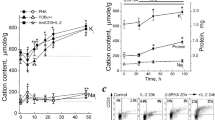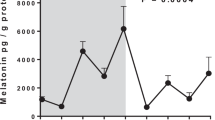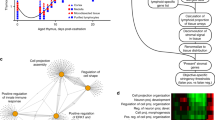Abstract
CELL PROLIFERATION is assumed to be under the control of homeostatic mechanism(s)1. Bullough and Laurence2 introduced the concept of cell-specific endogenous inhibitors of cell proliferation, the so-called chalones. Evidence for the existence in lymphoid tissues of factors meeting the criteria for the definition of a lymphocyte chalone has been reported by several groups3–6. The nature of these substances however is ill-defined, since purification from crude extracts of lymphoid tissue (thymus and spleen) has been only partly successful. A lymphocyte inhibitor isolated from bovine thymus tissue has been suggested to be a spermine protein complex7: it was quoted that the inhibitory activity on lymphocyte proliferation in vitro could only be observed if fetal calf serum (FCS) was present in the culture medium7. In contrast to these findings we now report the existence of a nondialysable, active substance extracted from bovine thymus tissue, that inhibits strongly in vitro proliferation of human and murine lymphoid cells in the absence of FCS.
This is a preview of subscription content, access via your institution
Access options
Subscribe to this journal
Receive 51 print issues and online access
$199.00 per year
only $3.90 per issue
Buy this article
- Purchase on Springer Link
- Instant access to full article PDF
Prices may be subject to local taxes which are calculated during checkout
Similar content being viewed by others
References
Bullough, W. S. Biol. Rev. 37, 307–342 (1962).
Bullough, W. S. & Laurence, E. B. Expl Cell Res. 33, 176–194 (1964).
Kiger, N., Florentin, I. & Mathé, G. Transplantation 16, 393–397. (1973).
Garcia-Giralt, E., La Salvia, E., Florentin, I. & Mathé, G. Eur. J. clin. biol. Res. 15, 1012–1015 (1970).
Attallah, A. M., Sunshine, G. J., Hunt, C. V. & Houck, J. C. Expl Cell Res. 93, 283–292 (1975).
Heideman, E., Jung, A. & Wilms, K. Klin. W. Schr. 54, 221–226 (1976).
Allen, J. C., Smith, C. J., Curry, M. C. & Gaugas, J. M. Nature 267, 623–625 (1977).
Byrd, W. J., Jacobs, D. M. & Amoss, N. S. Nature 267, 621–623 (1977).
Bachrach, U., Abzug, S. and Bekierkunst, A. Biochim. biophys. Acta 134, 174–181 (1967).
Alarcon, R. A. Archs Biochem. Biophys. 106, 240–242 (1964).
Gaugas, J. M. & Curzen, P. Lancet i, 18–20 (1978).
Tabor, C. W. & Tabor, H. A. Rev. Biochem. 45, 285–306 (1976).
Rijke, E. O. & Ballieux, R. E. 9th Workshop on Leucocyte Cultures, Mainz (1978) (abstr.).
Rijke, E. O., Lempers, H. C. & Ballieux, R. E. 9th Ann. M Scand. Soc. Immun. Stockholm (1978). Scand. J. Immun. (in the press) (abstr.).
Author information
Authors and Affiliations
Rights and permissions
About this article
Cite this article
RIJKE, E., BALLIEUX, R. Is thymus-derived lymphocyte inhibitor a polyamine?. Nature 274, 804–805 (1978). https://doi.org/10.1038/274804a0
Received:
Accepted:
Issue Date:
DOI: https://doi.org/10.1038/274804a0
This article is cited by
-
Inhibition of lymphocyte production via thymic factors
Blut (1981)
-
Humorale Regulatoren der Zellproliferation in der H�matopoese
Klinische Wochenschrift (1980)
-
Inhibition of lymphocyte growth by spermidine in medium containing fetal bovine serum
In Vitro (1980)
-
Is lymphocytic chalone activity restricted to a spermine–protein complex?
Nature (1979)
Comments
By submitting a comment you agree to abide by our Terms and Community Guidelines. If you find something abusive or that does not comply with our terms or guidelines please flag it as inappropriate.



